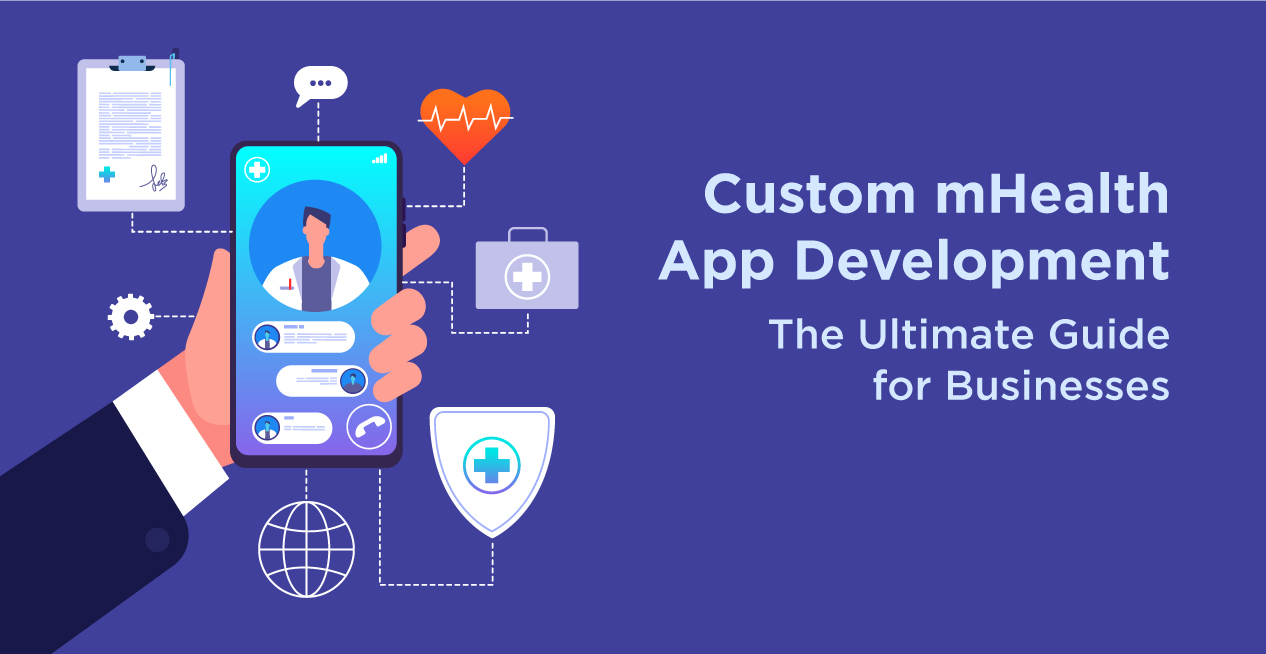In a survey by Statista, the market size of mobile healthcare or mHealth applications is estimated to be worth 257 billion dollars by 2025. With healthcare institutions and caregivers investing in healthcare mobile application development all around the world, the popularity of mobile applications is going through the roof. Most healthcare organizations are providing remote care, better patient care, and record-keeping with the help of healthcare software and applications integrated into operational systems.
What are Mobile health apps and mHealth app development?
Fundamentally, mHealth applications are software designed by healthcare providers or medical practitioners to digitally transform healthcare for its patients. A huge variety of mobile technology in healthcare tools and innovative solutions are employed by organizations and medical practitioners to help collect data from health informatics apps and software and implement them in a patient-centered healthcare model. Patient-centered healthcare model caters to healthcare that is provided based on an individual’s medical history, preferences, fitness goals, and more.
MHealth app development refers to software development of applications built for healthcare industries. These types of applications include:
- Medical diagnosis applications
- Fitness studio applications
- Mental health assistance applications
- Remote monitoring applications
- Telehealth applications
- Drug reference software
- Electronic health record software
- Appointment reminders systems
- Chronic disease management systems
Healthcare app development trends
The CAGR of the healthcare app development market is expected to be 17.6% from 2021 to 2028 which is a high number compared to the other industries undergoing digital transformation. The COVID-19 pandemic further propelled the market to be adopted on a larger scale and at a faster pace. The market for adoption of healthcare applications rose by 60%.
Better smartphones and fast internet connectivity have further encouraged this rise of healthcare mobile app development. Given is a graphical representation of the same.
Some of the up-and-coming trends are :
Artificial Intelligence (AI) & Machine Learning (ML)
Big data, virtual reality, artificial intelligence, machine learning, and chatbots for pharmaceutical firms are no longer futuristic concepts but rather an integral part of our reality. Be it digital therapy tools or chatbots to handle emergencies, AI is slowly facilitating healthcare for everyone.
The development of mobile apps for healthcare has integrated analytics and clinical decision-making. These applications also offer data on diagnostics, patient outcomes, therapy variations, and hitherto unheard-of insights.
AR/VR
Another marked trend in healthcare mobile applications is AR and VR. The technology enhances the workflows of practitioners using virtual reality tools, enabling patients to get appropriate medical advice even while they are not present physically. It has been shown that patients recover from trauma more rapidly and readily in virtual reality environments.
However, AR and VR technologies can help surgeons operate more precisely during surgery. AR and VR technologies when integrated with mHealth apps are also excellent tools when it comes to simulation surgeries or forecasting best practices for the same.
Big Data
The healthcare industry is one of the biggest collectors of data which is essential for progress and innovation in the medicare industry. This includes crucial patient data that is necessary for providing all-encompassing treatment, such as demographics, progress notes, medication, drug, and treatment histories. Analysis of this data also helps recognize life-saving health patterns and research.
For example, the treatment of cancer patients involves data mining of such patient records to understand the effect of different treatments. This further amounts to better research and advanced treatments and trials.
Chatbot
A plethora of use cases for chatbots have been designed expressly for the healthcare industry that has the potential to completely transform healthcare services by enhancing their responsiveness, personalization, and intuitiveness. Already known for raising the standard of customer care and assistance, chatbots are gaining popularity at a lightning pace. Healthcare organizations are also using chatbots to offer quick, personalized healthcare services through the use of mobile applications and similar concepts.
Cloud Computing
Cloud Computing is yet another technology that is making waves in health application development. Compared to conventional patient record keeping, insurance tracking, medical billings, and other crucial details, cloud computing in healthcare software provides a much better approach to simplifying and organizing humongous amounts of patient data.
Integrating cloud-based mobile apps with electronic medical records (EMR) and electronic health records (EHR) has proven to be a game-changer. Such mobile applications facilitate this connection, which simplifies data administration and guarantees effective healthcare operations even in the face of previously unheard-of healthcare issues.
Internet of Things (IoT) and Wearable Devices
MHealth applications are also actively employing the Internet of Things aka IoT technology and repeating multiple benefits of the same. The technology plays a crucial role in the real-time tracking of medical equipment and patient data. It is extremely useful in maintaining continuous information and interpreting it in real-time.
Smartwatches, smart heart devices, and AI glasses are a few of the examples that are changing the healthcare landscape for their effective tracking and information sharing. IoT-based healthcare apps have the potential to significantly improve patient well-being while also improving the overall performance of the healthcare system.
Remote Patient Monitoring (RPM)
Remote Patient Applications aka RPMs allow patients to track their daily health parameters, and the data is automatically added to an extensive database. RPM-based mobile apps are quite convenient for patients who have trouble visiting the hospital frequently. The development of healthcare applications is helpful in this situation.
The information supplied to the RPM applications can then be reviewed by the relevant medical professional or healthcare provider. Amazingly, they can accomplish this without face-to-face contact because they can remotely access and evaluate patient data.
Telemedicine
By allowing telemedicine, medical app development has played a critical role in altering the healthcare sector. This breakthrough is gaining steam since these applications enable contactless healthcare processes, making it much easier for healthcare personnel to respond to crises such as the COVID-19 epidemic.
Benefits of Building a Health App
With many benefits to offer, health applications are becoming popular as we speak. Below are a few of them.
- Accurate diagnosis
Data collected from health applications gives an accurate diagnosis which further results in quicker healthcare delivery, improved treatment plans, and successful outcomes. - Faster processing
Patients benefit from faster processing and consultation from doctors who make choices and prescribe medications immediately after their records have been integrated. - Improved communication
Health application platforms with remote access help connect doctors with patients for critical consultations and talks that are both rapid for communication and lessen gaps owing to the doctors’ greater availability. - Remote assistance
Doctors can check patients’ health remotely without requiring a personal meeting by contacting them via video conferences, phone conversations, or chat applications. It eliminates the need for patients to waste time traveling to the hospital, waiting in lines, or even leaving their homes. - Effective task allocation
Using mHealth applications, scheduling visits for patients at the most convenient times. They can also manage critical jobs via mobile and online apps. - Brand awareness
Mobile healthcare application is also elemental in maintaining brand faith amongst its customers which is fleeting these days given the rise in malpractices in the medical field.
How to Build A Healthcare App?
Though the popularity of healthcare application development has risen, the process remains as coveted and meticulous as ever. To develop a health app that is reliable, robust, and versatile, one needs to develop an application by following simple steps.
What is the problem?
In the case of any software development, identifying the problem a client is facing is essential. The problem offers the directive of the entire development process. For example, a client wants to offer dental services at a reasonable price to its customers. Primary research should then be done on certain parameters of the existing applications such as competitors, features that the application must have, services being offered etc.
Deciding Intended/ Target Audience
Deciding a target audience is the next biggest step in the app development process after identifying the problem. Target audiences are initially decided by their demographic- country, ethnicity, profession, age group, average income, etc. The product is then designed to cater to one such niche of the demographic. For example, a health app that recalls medications would have a target audience of senior citizens, of sixty and above with disposable income in tier 1 cities who have the technical aptitude to use the app. Other parameters such as gender, place of residence, medical history, etc also help decide a target audience for a digital health application.
Market Analysis
As mentioned above there are multiple trends in the market when it comes to healthcare software development. It is important to stay up to date with these trends and analyze them. The Healthcare software development companies who are developing a product for a client must study this trend effectively and equip themselves with skill sets for the same.
Choose App Category
Many categories of healthcare applications offer a myriad of features. A few of the popular categories of applications are:
- Telemedicine
- eHealth
- Remote patient monitoring
- Electronic health record
- Medical diagnosis
- Medical imaging
- Medical billing
- Electronic prescribing
- Information management
- Medical imaging software
- Medical database software
- Electronic health record
Designing Interface
Healthcare applications are used by a variety of users- from senior citizens to young children. This is the reason that the design of such apps should be basic but straightforward for the app to be successful. Its interface should maintain a user-friendly design, the app must also have interaction points to ensure that the user has no hassles when using the app. Additionally, you may maximize the cognitive burden of your software.
Build MVP
MVP or a Minimum Viable Product refers to the very basic application that is first introduced to the markets to garner customer feedback. This actionable feedback from users is crucial to further improve the product and remove its limitations.
Features to include in a Healthcare application
Here is a list of features every healthcare application should have.
- Registration window
- Profile screen and homepage
- Search and filter options
- Surveys and forms
- Ratings and reviews
- Appointment scheduling
- Video and voice calls
- Online chat
- Payment options
- Collect Feedback, Update, and RepeatFor doctors, the features could include:
- Scheduling options
- Dashboard
- Notifications and Alerts panels
- Patients Health Records
- Chat options
- Doctor’s profile and portfolio
Conclusion
Healthcare applications are popular and justifiably so given the benefits they deliver, the innovation they encourage, and the convenience they bring to the industry. The demand for such applications is only set to increase rapidly in the coming years. Many software development companies in the market offer healthcare app development services but no one does it better than OpenXcell.
OpenXcell is a leading healthcare app development company that has set a benchmark for quality healthcare applications. One of the most successful case studies it has worked on is HealthifyMe. Openxcell successfully helped the company develop a modern cloud-based system that could monitor and control the company’s daily processes and operations.









